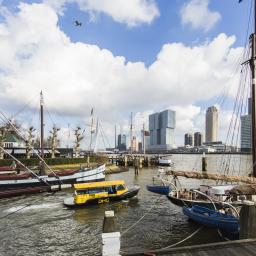 What does it mean for a city when a university settles there, and vice versa? We put this question to Professor Erwin Muller, chair of Leiden University's Campus The Hague and dean of the Faculty of Governance and Global Affairs (FGGA) which is located in The Hague.
What does it mean for a city when a university settles there, and vice versa? We put this question to Professor Erwin Muller, chair of Leiden University's Campus The Hague and dean of the Faculty of Governance and Global Affairs (FGGA) which is located in The Hague.
Campus The Hague of Leiden University is situated between two government ministries and near The Hague Central Station. One of the five buildings is the Wijnhaven Building, which is open to the public and where courses are taught, and research carried out by all seven faculties of Leiden University, the Leiden University Medical Center and TU Delft.

The Hague: the heart of politics, policy and governance
‘The idea for Leiden University to have a campus in The Hague arose around twenty years ago. Even then the importance of the interaction between city and university was recognised, particularly for teaching and research within the political sciences, public administration and history. And of course, this is particularly appropriate for The Hague as the national seat of politics, policy and governance. Moreover, The Hague is a very international city with all the international institutions and companies that are settled there, so degree programmes such as International Studies and International Relations Organisations and teaching and research in the field of Global Challenges and international law fit in well with the city.’
‘The size of The Hague, the complex big-city problems that play far more of a role here than in Leiden, make it interesting for researchers and students alike. And then, of course, you are far more likely to bump into your client from a municipality, ministry, NGO or the business community here. Officials from nearby ministries can pop round to give presentations in the Wijnhaven Building.’
Officials from nearby ministries can simply pop by to give presentations at the Wijnhaven building.'

An exchange between the city and university
‘We now have around 6,300 students at Campus The Hague and over 500 staff members. This brings something to the city, and also asks something of the city. We are happy that this is all going so successfully. It is very valuable to us that we can be in an environment into which we also conduct our research. Conversely, we also want to contribute something to the city, to be a partner in the big issues.’
‘An example of our new strategy is ‘Children of the city’ in which we are contributing our ideas to the City on how to support first-generation university students. These are often students with a migration background. It is important to us that the university is just as accessible and achievable for these students as for everyone else. We also make our buildings available for weekend schools that children from so-called disadvantaged districts can participate in.’
It is very valuable that we can be in an environment which we can also research.'
A place for collaboration
‘This Campus is also a place where we cooperate with Erasmus University Rotterdam and TU Delft. Here again, we are seeking cooperation with the city. From the Faculty of GGA I can see a great collaboration coming about in the field of cybersecurity and cyber crime, and this links in turn to the sectoral collaboration The Hague Security Delta.’
 ‘We are seeing much interest in urban issues among our students too. There is a great deal of interest in our Bachelor's degree programme in Urban Studies, that started from Leiden University 18 months ago, so we will be looking into whether we can expand this with a Master's degree programme and possibly even further with training for professionals.’
‘We are seeing much interest in urban issues among our students too. There is a great deal of interest in our Bachelor's degree programme in Urban Studies, that started from Leiden University 18 months ago, so we will be looking into whether we can expand this with a Master's degree programme and possibly even further with training for professionals.’
Thesis-hub: The Hague Zuid-West
‘We also want a reciprocal exchange of knowledge elsewhere in the city. For example in the district Den Haag Zuid-West, where we are working with the Leiden-Delft-Erasmus Centre Governance of Migration and Diversity to start a thesis research facility where students work together with civil servants to give a new boost to specific issues that affect the district.’
Cities grow, and knowledge is developed in cities, yet Muller also wants to maintain a broader perspective. ‘Of course, we want to continue making the link between the cities and the rest of the Netherlands.’
 Follow Campus The Hague
Follow Campus The Hague
Read more about the new strategy from Campus The Hague in this online brochure. Follow Campus The Hague by signing up for the university newsletter:
Sign up




